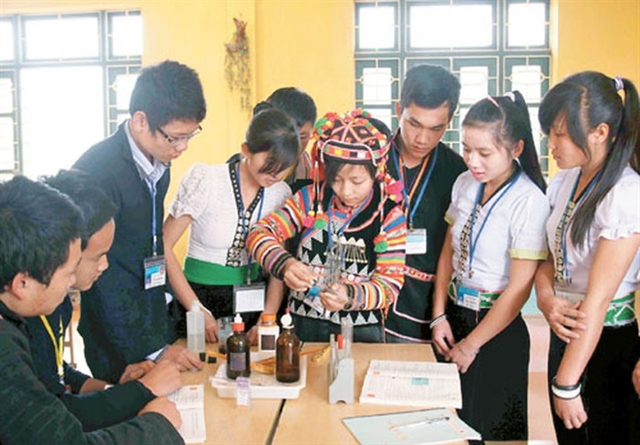 Society
Society

Women from ethnic minority groups still face limited access to beneficial development policies, a conference in Hà Nội heard on Monday.

|
| Ethnic minority students in northern mountainous Cao Bằng Province conduct a science experiment. — VNA/VNS Photo |
HÀ NỘI — Women from ethnic minority groups still face limited access to beneficial development policies, a conference in Hà Nội heard on Monday.
The workshop was held to discuss challenges and solutions to promote the development of ethnic women with the aim of leaving no one behind.
Many ethnic minority women are unable to fully access opportunities presented by development programmes, meaning they still lag behind in some areas, said Chairwoman of the Việt Nam Women’s Union Nguyễn Thị Thu Hà.
The rate of illiteracy among women from ethnic minorities is nearly 27 per cent, while the rate of male illiteracy is around 14 per cent.
Only 33 per cent of ethnic minority girls attend high school at the right age and a mere 7.2 per cent of female workers in ethnic minority areas get professional and technical training, according to Hà.
Among ethnic minority households, the rate of land and home ownership among women is 26 per cent, significantly lower than the rate of 56 per cent among women from the Kinh group – the main ethnic group of Việt Nam.
Although the Party and State pay great attention to developing the mountainous and ethnic minority areas, the gap is expected to increase as the society develops rapidly because ethnic minority women face many barriers, she said
“Poverty and fewer opportunities to get access to basic social services are key barriers leaving ethnic minority women behind in the development process,” Hà said.
Nguyễn Thị Mai Hoa from the National Assembly’s Committee for Culture, Education, Youth, Adolescents and Children said many policies designed to support ethnic minority women are not strategic enough and lack proper plans and therefore often overlap, reducing their efficacy.
Shortcomings remained in policies promoting gender equality in ethnic minority areas, she said, adding that only 3.4 per cent of 118 policies and programmes supporting development for these areas have regulations relating to gender equality.
Participants at the conference also pointed to limitations in implementing policies due to a lack of resources and overlapping management authority of ministries.
Kamal Malhotra, UN Resident Coordinator in Việt Nam, said Việt Nam has joined many treaties and agreements on women and has made progress on gender inequality among ethnic minority communities in the fields of economy, labour education, training and healthcare.
With Việt Nam committed to implementing the Sustainable Development Goals with the aim of leaving nobody behind, he suggested the country’s efforts to end gender inequality in ethnic minority areas must be built upon Việt Nam's existing international commitments.
The UN was willing to support Việt Nam in this important work, he said.
Head of the Communist Party of Việt Nam Central Committee’s Commission on Mass Mobilisation, Trương Thị Mai, said the Party and State consider ethnic minority affairs an urgent, long-term issue with priority given to the comprehensive development of mountainous and ethnic minority areas, particularly in infrastructure.
She stressed that equality and opportunities are important for ethnic minority people, especially women, and that they should be encouraged to access education. — VNS




